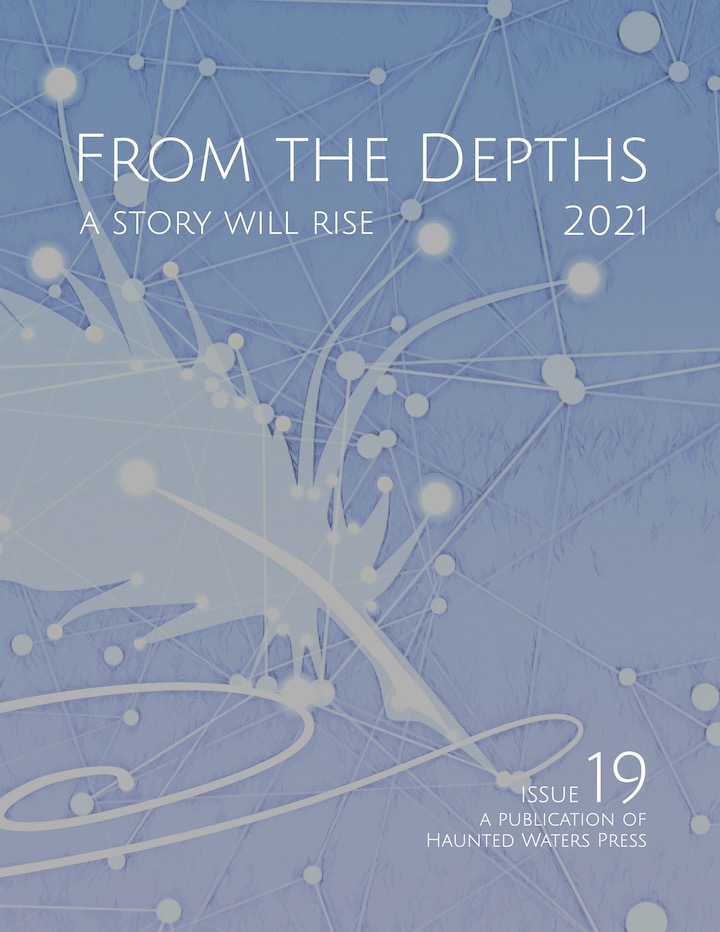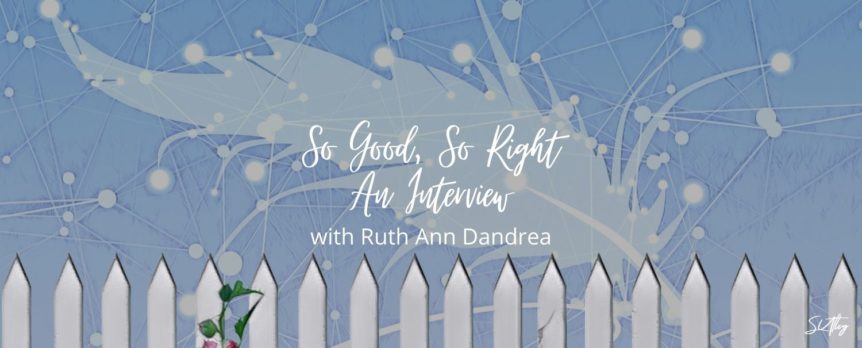An Interview with Ruth Ann Dandrea
Thank you for joining us for another Haunted Waters Press Featured Author Interview. In this series, we sit down with contributors to chat about their craft and explore the experiences that have shaped their writing.
Today's interview is with HWP Contributor Ruth Ann Dandrea. Ruth's short story Get Up On Your Good Foot and Dance is showcased in the 2021 issue of From the Depths. We thoroughly enjoyed our chat with Ruth. We think you will too!
What joys and challenges do you find in writing short fiction?
There is a moment during the writing of a story when the story takes over. Every writer probably says some version of this. But a time when you lose yourself. And when you find yourself again, there you are, with a story before you that you can barely recognize as your own work. That's worth everything that goes before, comes after it. A friend told me recently when I was griping about not having yet written a story that month, "Why don't you give yourself a break?" It was as if she were speaking a different language to me. A thought I'd never thought. Stop writing? Stop breathing. Same thing. Just a different kind of death. Sparking the story is always the biggest challenge. What tidbit or talk or tension or tightrope walking can you turn into fiction?
Is there a particular piece of writing or an author you feel has influenced you most as a writer?
Annie Dillard, Richard Russo, and Tom Robbins are my Mother, Son, and Unholy Ghost of writing. I've read almost everything they've written, studied it, even. Because I taught their books, I must also credit the profound influences of John Steinbeck's The Grapes of Wrath, Ernest Hemingway's A Farewell to Arms, and J. D. Salinger's The Catcher in the Rye. You can't read a book every year for twenty years and not learn something from it.
Stop writing? Stop breathing. Same thing. Just a different kind of death.
Do you have any go-to books about writing or the creative process? What's on your bookshelf?
Natalie Goldberg is my guru. I have all of her books. Used them to teach writing to high school kids and myself for years and years. Then, finally, got myself to Santa Fe for an in-person meditation and writing retreat. It was perfect! I also love Dillard, Georgia Heard, Mary Pipher, Julia Cameron, Elizabeth Gilbert, and Frances Mayes. All their books offer assistance and a way forward.
What is your workday like as a writer?
Some twenty years ago, after a difficult time, I sat alone on New Year's eve, thinking: you have said you wanted to be a writer since you were seven years old. When exactly are you planning to do this? (Actually, because of my childhood watching cowboys with my father, what I really said was, "It's time to either put up or shut up.") So I made a resolution to get up half an hour earlier every morning and write before I went to school each day. I had heard young adult writer Patricia Reilly Giff at an English teacher's conference say that this was how she started. I thought about giving myself weekends off, but I knew that would make Monday mornings way too hard. I told myself I would do it for two weeks; you can do anything for two weeks, I decided. (I think Giff gave herself a year and got up an hour early, but she taught elementary school, and they start later than high schoolers do.) One afternoon, during the first week, while driving home from school, I slipped into my usual self-chiding, telling myself I should go home and do some writing, and then I realized, I didn't have to. I had already written! It felt so good, so right, I have been doing it ever since.
Let’s talk first drafts. Do you compose on a computer, or are you a pen and paper writer?
I write poetry with a medium-point blue pen in a wide-ruled notebook. I wait for, conjure, try out the first lines of short stories that way, too. But, when it comes to creating fiction, writing the rest of the story, the real story, I go to the computer. I write in the morning until the coffee is gone. Then I move on with the rest of my day. The next morning, I reread what I've written and carry it forward.
Describe your editing process.
I am the world's worst rewriter. I begin with an opening line I love and follow it through. Rereading and correcting each day's work as I go forward. But as for an overall overhaul, I rarely get there. Not because I don't want to, but because I don't know how to, or a least I convince myself I can't. But I write a lot of stories, so some of them, I hope, turn out to be good.
How much of yourself do you allow to flow into your characters?
Usually, I begin in some sort of fact or literal truth, often an idea or situation from my own life, and write until the story lifts itself into fiction and a more universal truth. In "Get Up On Your Good Foot..." for instance, I am a woman who writes outside on her patio most summer mornings. But I've never planted my poems in the fence posts. That was the character's idea. She is much braver than I am.
What words do you live by? Do you have a personal motto?
Because I always hated it when I asked my kids after their first day of school each September what they had done on that all-important day, and they ALWAYS said, "We went over the rules," I vowed not to do that to my students. So I told them there was only ever one rule: Be Kind. It's as good a motto as I can devise.
If you could tell your younger writing self anything, what would it be?
Write first. Don't wait until the other stuff is done before having a creative life. Art matters.
What comes next for you as a writer?
I write a short story each month. February's story is begun. I can't talk about things I'm writing until they are done, otherwise, I won't write them. This year's resolution, though, was to compile a collection of short stories. Which seems a monumental job since I've been doing this for some twenty years and have almost 250 to choose from.

There is a moment during the writing of a story when the story takes over. Every writer probably says some version of this. But a time when you lose yourself. And when you find yourself again, there you are, with a story before you that you can barely recognize as your own work. That's worth everything that goes before, comes after it. A friend told me recently when I was griping about not having yet written a story that month, "Why don't you give yourself a break?" It was as if she were speaking a different language to me. A thought I'd never thought. Stop writing? Stop breathing. Same thing. Just a different kind of death. Sparking the story is always the biggest challenge. What tidbit or talk or tension or tightrope walking can you turn into fiction?
Is there a particular piece of writing or an author you feel has influenced you most as a writer?
Annie Dillard, Richard Russo, and Tom Robbins are my Mother, Son, and Unholy Ghost of writing. I've read almost everything they've written, studied it, even. Because I taught their books, I must also credit the profound influences of John Steinbeck's The Grapes of Wrath, Ernest Hemingway's A Farewell to Arms, and J. D. Salinger's The Catcher in the Rye. You can't read a book every year for twenty years and not learn something from it.
Stop writing? Stop breathing. Same thing. Just a different kind of death.
—Ruth Ann Dandrea
Do you have any go-to books about writing or the creative process? What's on your bookshelf?
Natalie Goldberg is my guru. I have all of her books. Used them to teach writing to high school kids and myself for years and years. Then, finally, got myself to Santa Fe for an in-person meditation and writing retreat. It was perfect! I also love Dillard, Georgia Heard, Mary Pipher, Julia Cameron, Elizabeth Gilbert, and Frances Mayes. All their books offer assistance and a way forward.
What is your workday like as a writer?
Some twenty years ago, after a difficult time, I sat alone on New Year's eve, thinking: you have said you wanted to be a writer since you were seven years old. When exactly are you planning to do this? (Actually, because of my childhood watching cowboys with my father, what I really said was, "It's time to either put up or shut up.") So I made a resolution to get up half an hour earlier every morning and write before I went to school each day. I had heard young adult writer Patricia Reilly Giff at an English teacher's conference say that this was how she started. I thought about giving myself weekends off, but I knew that would make Monday mornings way too hard. I told myself I would do it for two weeks; you can do anything for two weeks, I decided. (I think Giff gave herself a year and got up an hour early, but she taught elementary school, and they start later than high schoolers do.) One afternoon, during the first week, while driving home from school, I slipped into my usual self-chiding, telling myself I should go home and do some writing, and then I realized, I didn't have to. I had already written! It felt so good, so right, I have been doing it ever since.
Let’s talk first drafts. Do you compose on a computer, or are you a pen and paper writer?
I write poetry with a medium-point blue pen in a wide-ruled notebook. I wait for, conjure, try out the first lines of short stories that way, too. But, when it comes to creating fiction, writing the rest of the story, the real story, I go to the computer. I write in the morning until the coffee is gone. Then I move on with the rest of my day. The next morning, I reread what I've written and carry it forward.
Describe your editing process.
I am the world's worst rewriter. I begin with an opening line I love and follow it through. Rereading and correcting each day's work as I go forward. But as for an overall overhaul, I rarely get there. Not because I don't want to, but because I don't know how to, or a least I convince myself I can't. But I write a lot of stories, so some of them, I hope, turn out to be good.
How much of yourself do you allow to flow into your characters?
Usually, I begin in some sort of fact or literal truth, often an idea or situation from my own life, and write until the story lifts itself into fiction and a more universal truth. In "Get Up On Your Good Foot..." for instance, I am a woman who writes outside on her patio most summer mornings. But I've never planted my poems in the fence posts. That was the character's idea. She is much braver than I am.
What words do you live by? Do you have a personal motto?
Because I always hated it when I asked my kids after their first day of school each September what they had done on that all-important day, and they ALWAYS said, "We went over the rules," I vowed not to do that to my students. So I told them there was only ever one rule: Be Kind. It's as good a motto as I can devise.
If you could tell your younger writing self anything, what would it be?
Write first. Don't wait until the other stuff is done before having a creative life. Art matters.
What comes next for you as a writer?
I write a short story each month. February's story is begun. I can't talk about things I'm writing until they are done, otherwise, I won't write them. This year's resolution, though, was to compile a collection of short stories. Which seems a monumental job since I've been doing this for some twenty years and have almost 250 to choose from.


Lightning Round with Ruth Ann Dandrea

ABOUT THE AUTHOR
Ruth Ann Dandrea is a writer, a reader, a gardener, a kayaker, and a grandmother. Summer Thursdays you can find her (or join her) paddling a yellow boat on quiet Adirondack waters.
Share this Post

